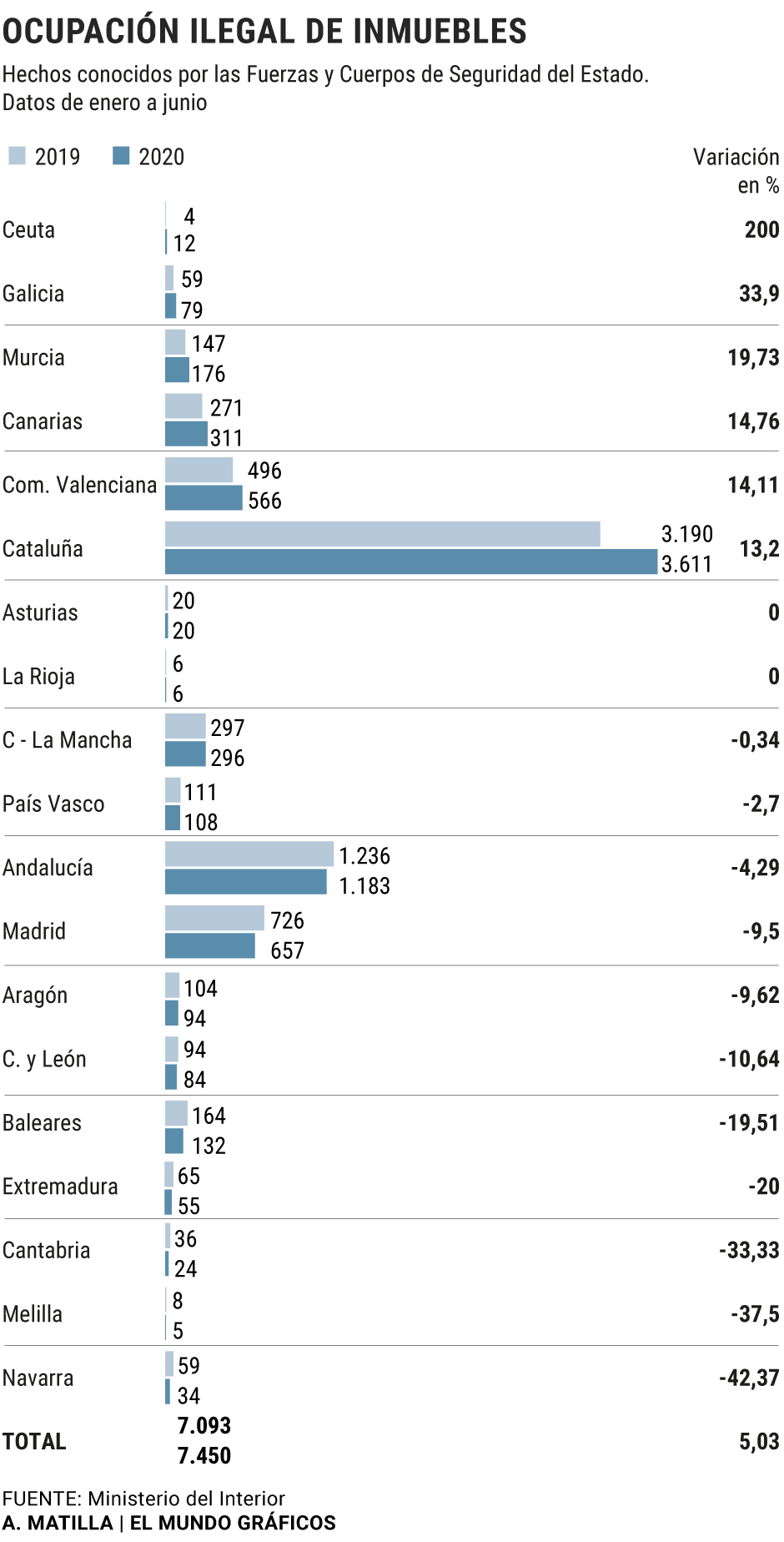PREMIUM
MARTA LAW
@leymarta
Madrid
Sunday, July 26, 2020 - 10:11 PM
- Share on Facebook
- Share on Twitter
- Send by email
- 2018. Illegal occupation of homes grows 58% in five years
- Justice. Condemned to pay 540 euros to 'squat' a luxury chalet for two years
The illegal occupation of houses grows every year in Spain. If in 2013 the Civil Guard, the National Police and the regional and local police forces reported 7,739 cases, in 2018 the figure was 12,214, a growth of 58% in five years. The most current data indicates that the trend continues to rise. Only between January and June of this year the number of complaints of squatting was 7,450, 5% more than in the same period last year, according to data provided by the Ministry of the Interior.
With these figures, it can be said that on average there are 41 complaints per day for squatting a property. The information broken down by autonomous community shows that the problem has a different dimension in each region. In Galicia, it has gone from 59 complaints in the first six months of 2019 to 79 this year, which shows an interannual increase of 33.9%.
Murcia has also seen growth of almost 20% in just one year, in the absence of complete data for the current year. In the Canary Islands and the Valencian Community, the number of reports of squatting has grown slightly more than 14%. Finally, in Catalonia, the trend also points to an increase in crime, with 13% more complaints than in the same period last year.
In the rest of the regions, the number of squats has decreased. In the Balearic Islands, the fall is 19% compared to the previous year; in the Community of Madrid, there have been 9.5% fewer complaints; and in Andalusia, they are down 4.3%.
Although it is not the area where complaints have increased the most so far this year, Catalonia is by far the most affected autonomy. The 3,611 squats known during the first semester of 2020 represent a rate of about 92 per 100,000 homes. Far behind are the Canary Islands (29.4), Andalusia (26.6) and Castilla-La Mancha (23.2). At the opposite extreme, squatting affects three out of every 100,000 properties, in La Rioja or Asturias.
Although the number of illegally occupied homes in Spain is unknown, the Cerdá Institute estimates that in 2017 more than 87,500 families lived squatting a house, 0.33% of the housing stock of that year, according to data from the Ministry of Transport, Mobility and Urban Agenda.
Following the approval of Law 5/2018 on July 3, which was intended to facilitate the eviction of the squatters , the General Council of the Judiciary ( CGPJ ) began to collect data on the illegal occupation of homes that end reaching the courts in cases where the owners are individuals, non-profit entities or public entities that own social housing.
In the first quarter of 2020, 792 cases entered the courts, 12.1% less than in the first quarter of 2019. 717 have been resolved and 2,216 have been processed. Once again, the greatest number of lawsuits were filed in Catalonia (203), representing 22.6%. They are followed by Andalusia (194), Valencian Community (87) and Madrid (69), the CGPJ reported in a press release.
To recover a property after squatting, there are criminal or civil channels. The new regulations approved in July 2018, also known as the Express Eviction Law , allow that when the procedure is civil, it is not necessary to identify those who occupy the house, which has streamlined these processes.
Through this civil procedure, the occupant is condemned to vacate the property and to pay the expenses, as well as the damages that have occurred without any recourse. When the fact is denounced through the criminal route, under the crime of usurpation or occupation, the procedure is longer.
The penalties for these crimes vary depending on whether violence or intimidation has been used to squat the house, and convicts can face between one and two years in prison.
The most common cases are those of people in vulnerable situations who go to squatter mafias to obtain housing, according to Lorena Rojas and Angy Alvarado . "The most coveted flats to squat are those belonging to banks, investment funds and public rental parks," the director of the foresight area of the Cerdá Institute, Miguel Hernández Moreno , told this newspaper in late 2019 . The squats of private houses, although they are the most media, "are much less."
According to the criteria of The Trust Project
Know more- Catalonia
- Spain
- National Police
- Civil Guard
- General Council of the Judiciary
- Evictions
EventsA gang falls for doing more than 80 scams online with material against the Covid-19
Government Pedro Sánchez is absent from the first funeral for the victims of the Covid-19
CoronavirusFrance "strongly recommends" its citizens not to travel to Catalonia due to outbreaks
See links of interest
- News
- Translator
- Programming
- Calendar
- Horoscope
- Classification
- League calendar
- Films
- Themes
- Live: Moto3 Andalusian GP
- Live: Moto2 Andalusian GP
- Live: MotoGP Andalusian GP
- Juventus - Sampdoria

